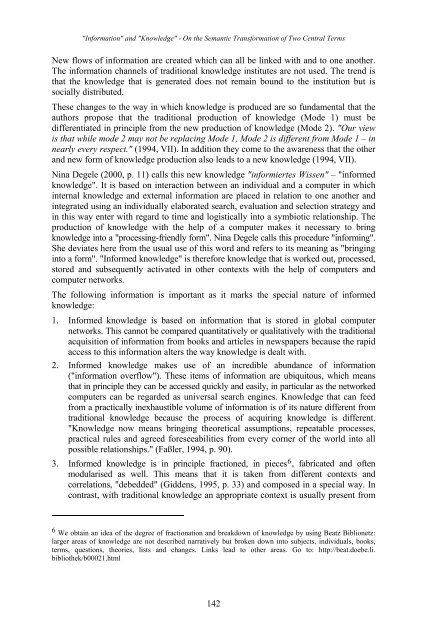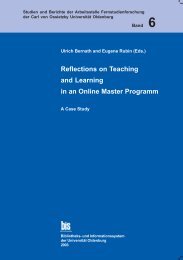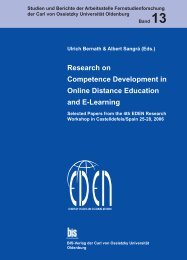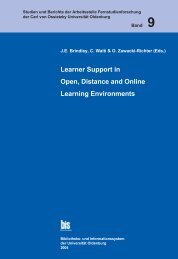Distance Education in Transition - Master of Distance Education ...
Distance Education in Transition - Master of Distance Education ...
Distance Education in Transition - Master of Distance Education ...
Create successful ePaper yourself
Turn your PDF publications into a flip-book with our unique Google optimized e-Paper software.
"Information" and "Knowledge" - On the Semantic Transformation <strong>of</strong> Two Central Terms<br />
New flows <strong>of</strong> <strong>in</strong>formation are created which can all be l<strong>in</strong>ked with and to one another.<br />
The <strong>in</strong>formation channels <strong>of</strong> traditional knowledge <strong>in</strong>stitutes are not used. The trend is<br />
that the knowledge that is generated does not rema<strong>in</strong> bound to the <strong>in</strong>stitution but is<br />
socially distributed.<br />
These changes to the way <strong>in</strong> which knowledge is produced are so fundamental that the<br />
authors propose that the traditional production <strong>of</strong> knowledge (Mode 1) must be<br />
differentiated <strong>in</strong> pr<strong>in</strong>ciple from the new production <strong>of</strong> knowledge (Mode 2). "Our view<br />
is that while mode 2 may not be replac<strong>in</strong>g Mode 1, Mode 2 is different from Mode 1 – <strong>in</strong><br />
nearly every respect." (1994, VII). In addition they come to the awareness that the other<br />
and new form <strong>of</strong> knowledge production also leads to a new knowledge (1994, VII).<br />
N<strong>in</strong>a Degele (2000, p. 11) calls this new knowledge "<strong>in</strong>formiertes Wissen" – "<strong>in</strong>formed<br />
knowledge". It is based on <strong>in</strong>teraction between an <strong>in</strong>dividual and a computer <strong>in</strong> which<br />
<strong>in</strong>ternal knowledge and external <strong>in</strong>formation are placed <strong>in</strong> relation to one another and<br />
<strong>in</strong>tegrated us<strong>in</strong>g an <strong>in</strong>dividually elaborated search, evaluation and selection strategy and<br />
<strong>in</strong> this way enter with regard to time and logistically <strong>in</strong>to a symbiotic relationship. The<br />
production <strong>of</strong> knowledge with the help <strong>of</strong> a computer makes it necessary to br<strong>in</strong>g<br />
knowledge <strong>in</strong>to a "process<strong>in</strong>g-friendly form". N<strong>in</strong>a Degele calls this procedure "<strong>in</strong>form<strong>in</strong>g".<br />
She deviates here from the usual use <strong>of</strong> this word and refers to its mean<strong>in</strong>g as "br<strong>in</strong>g<strong>in</strong>g<br />
<strong>in</strong>to a form". "Informed knowledge" is therefore knowledge that is worked out, processed,<br />
stored and subsequently activated <strong>in</strong> other contexts with the help <strong>of</strong> computers and<br />
computer networks.<br />
The follow<strong>in</strong>g <strong>in</strong>formation is important as it marks the special nature <strong>of</strong> <strong>in</strong>formed<br />
knowledge:<br />
1. Informed knowledge is based on <strong>in</strong>formation that is stored <strong>in</strong> global computer<br />
networks. This cannot be compared quantitatively or qualitatively with the traditional<br />
acquisition <strong>of</strong> <strong>in</strong>formation from books and articles <strong>in</strong> newspapers because the rapid<br />
access to this <strong>in</strong>formation alters the way knowledge is dealt with.<br />
2. Informed knowledge makes use <strong>of</strong> an <strong>in</strong>credible abundance <strong>of</strong> <strong>in</strong>formation<br />
("<strong>in</strong>formation overflow"). These items <strong>of</strong> <strong>in</strong>formation are ubiquitous, which means<br />
that <strong>in</strong> pr<strong>in</strong>ciple they can be accessed quickly and easily, <strong>in</strong> particular as the networked<br />
computers can be regarded as universal search eng<strong>in</strong>es. Knowledge that can feed<br />
from a practically <strong>in</strong>exhaustible volume <strong>of</strong> <strong>in</strong>formation is <strong>of</strong> its nature different from<br />
traditional knowledge because the process <strong>of</strong> acquir<strong>in</strong>g knowledge is different.<br />
"Knowledge now means br<strong>in</strong>g<strong>in</strong>g theoretical assumptions, repeatable processes,<br />
practical rules and agreed foreseeabilities from every corner <strong>of</strong> the world <strong>in</strong>to all<br />
possible relationships." (Faßler, 1994, p. 90).<br />
3. Informed knowledge is <strong>in</strong> pr<strong>in</strong>ciple fractioned, <strong>in</strong> pieces6 , fabricated and <strong>of</strong>ten<br />
modularised as well. This means that it is taken from different contexts and<br />
correlations, "debedded" (Giddens, 1995, p. 33) and composed <strong>in</strong> a special way. In<br />
contrast, with traditional knowledge an appropriate context is usually present from<br />
6 We obta<strong>in</strong> an idea <strong>of</strong> the degree <strong>of</strong> fractionation and breakdown <strong>of</strong> knowledge by us<strong>in</strong>g Beatz Biblionetz:<br />
larger areas <strong>of</strong> knowledge are not described narratively but broken down <strong>in</strong>to subjects, <strong>in</strong>dividuals, books,<br />
terms, questions, theories, lists and changes. L<strong>in</strong>ks lead to other areas. Go to: http://beat.doebe.li.<br />
bibliothek/b00021.html<br />
142





